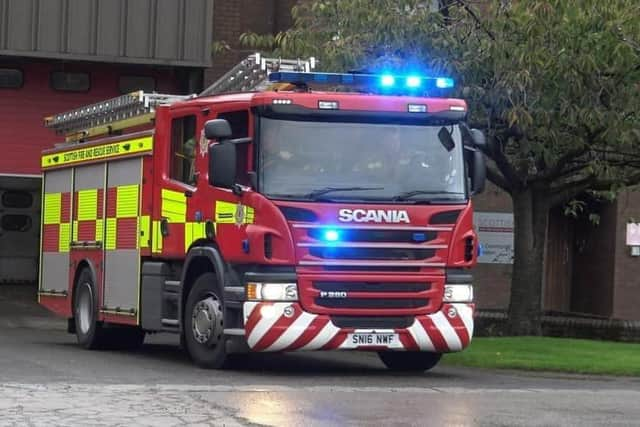Scottish Fire and Rescue Service is in crisis, warns 'damning' new report
Scotland's fire service is in “crisis” amid plummeting staff morale and damaging budget cuts, a new report has warned.
The Fire Brigades Union (FBU) said a "firestorm" of factors is impacting on the ability of the service to respond to serious and life-threatening incidents.
Advertisement
Hide AdAdvertisement
Hide Ad"We cannot go on like this, our members and the public have had enough," said Scottish secretary John McKenzie.


The new report, commissioned by the FBU, identifies serious concerns with the situation in the service, with firefighters raising issues around response times, poor training, poor equipment and the health impact of fire contaminants.
Meanwhile, the condition of buildings in the Scottish Fire and Rescue Service (SFRS) estate is also highlighted, with 14 having issues with crumbly reinforced autoclaved aerated concrete (Raac).
"The SFRS is in crisis and morale is low amongst its staff,” the report says. “Workers are leaving in large numbers and year-on-year budget cuts are impacting on the ability of the service to respond effectively to serious and life-threatening incidents.”
It adds: “Since the advent of the single service over 1,200 firefighter jobs have been lost. If there is no change to the projected flat cash budget from the Scottish Government over the next four years, as many as a further 780 jobs are at risk, stations could close, and fire appliances will continue to be withdrawn from service.”
The report claims there has been “some” investment in equipment, but it says this has been slow and partial compared to other parts of the UK. Additionally, firefighters felt the training provided was inconsistent and inadequate.
Fire station commanders also told the union they do not feel they have adequate or up-to-date qualifications to train firefighters.
In a survey accompanying the report, around 93 per cent of respondents told the FBU they did not believe the SFRS was “adequately resourced enough to deal with the increase in climate-related incidents such as wildfires and flooding”.
Advertisement
Hide AdAdvertisement
Hide AdRecent incidents such as the Cannich wildfire near Inverness saw retained firefighters – who do not work for the fire service full-time – working 14-hour shifts in difficult terrain and “blistering heat” to battle the fire.
The report calls for the pension age of firefighters to be lowered from 60 to 55 as some workers feel they are unable to work in the physically and mentally challenging operational role until they are 60.
The FBU is currently consulting members over taking strike action in opposition to cuts. A projected five-year, flat cash budget, in place until 2027, has already removed 10 whole-time fire engines and 150 retained appliances are regularly unavailable due to significant recruitment and retention issues, the union said.
The SFRS has announced that it will need to save a minimum of £14 million next year.
Mr McKenzie said the report “paints a damning picture of underinvestment, declining standards and job losses, all which increases the risk to firefighters and public we serve”.
He said: “Over the last decade we have been failed by political leaders who have tried to ignore this crisis. They cannot ignore us now. It is now up to the Scottish Government, the SFRS management and all political parties to respond positively to this report, reverse the cuts and help build a Fire and Rescue Service that aspires to be world leading.”
Conservative MSP Sharon Dowey said: “This damning report fully exposes the reality as to what years of deeply damaging cuts by the SNP has done to our fire service. Stations have lost vital appliances and 1,200 jobs have been cut since the SNP’s centralisation a decade ago.
“If further cuts are imposed, then close to 800 more firefighters could be lost from duty. That is a completely intolerable situation and one which would only put lives at risk in our communities.”
Advertisement
Hide AdAdvertisement
Hide AdRoss Haggart, chief officer of the SFRS, said: “We note the publication of the FBU report and specifically of concerns highlighted of behaviours which fall beneath our high standards. We have a zero-tolerance approach to all forms of bullying, harassment and discrimination and the safety and wellbeing of our staff is paramount.”
She added: “We have been clear that we must modernise as a service to ensure we are best placed to meet the changing risk and demand we face across Scotland, while also addressing our ongoing financial challenges.
“Any permanent changes now or in the future will only be made following full engagement and consultation with all our stakeholders, including the FBU.
“We will take time to give full and proper consideration to the contents of this report and continue to work with all representative bodies, including the FBU, on potential impacts of any future savings and identify potential areas for improvement.”
A Scottish Government spokeswoman said: “Firefighters play a vital role in protecting our communities and the SFRS has continued to deliver the high standard of services required to keep Scotland safe. That is why, despite difficult financial circumstances due to UK Government austerity, we are providing SFRS with more than £368 million this year, an increase of £14.4 million on 2022-23.
“Whilst the allocation of resources, along with the recruitment and retention of firefighters, is an operational matter for SFRS, we are maintaining front-line services, with a higher number of firefighters in Scotland than other parts of the UK. Ministers will continue engaging with the FBU to discuss their concerns.”
Comments
Want to join the conversation? Please or to comment on this article.
